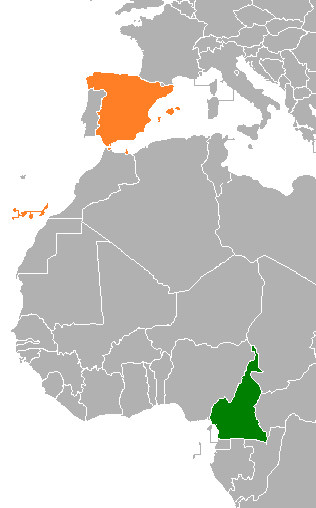
Antonio Pigafetta was a Venetian scholar and explorer. He joined the Spanish expedition to the Spice Islands led by Portuguese explorer Ferdinand Magellan, the world's first circumnavigation, and is best known for being the chronicler of the voyage. During the expedition, he served as Magellan's assistant until Magellan's death in the Philippine Islands, and kept an accurate journal, which later assisted him in translating the Cebuano language. It is the first recorded document concerning the language.

The Ministry of Foreign Affairs, European Union and Cooperation (MAEUEC) is a department of the Government of Spain in charge of planning, managing, carrying out and evaluating the country's foreign and international cooperation for development policies, paying special attention to the ones in relation to the European Union and Ibero-America, as well as coordinating and supervising all actions done in this areas by the other Ministries and Public Administrations. Likewise, it is responsible for promoting international economic, cultural and scientific relationships, taking part in the proposal and application of the migration policy, promoting cross-border and interterritorial cooperation, protecting Spaniards abroad and preparing, negotiating and processing the international treaties which Spain is part of.

The European Union National Institutes for Culture (EUNIC) is a network of European national institutes of culture and national bodies engaged in cultural and related activities beyond their national borders. EUNIC brings together organizations from all 27 EU member states and adds value through its global network of clusters. By pooling together the resources and expertise of its members and carrying out joint work on common areas of interest, EUNIC is a recognized partner of the European Union and its stakeholders in defining and implementing European policy on culture inside and outside the EU.

Philippines–Spain relations are the relations between the Philippines and Spain. The relations between the two nations span from the 16th century, the Philippines was the lone colony of the Spanish Empire in Asia for more than three centuries. Both nations are members of the Association of Academies of the Spanish Language and the United Nations.

The Spanish Agency for International Development Cooperation (AECID) is a Spanish autonomous agency responsible for the management of the Government international development cooperation policy.
The Menéndez Pelayo International Prize has been awarded since 1987 by the Menéndez Pelayo International University (UIMP) with the objective of honoring those persons whose literary or scientific work has a humanistic orientation and application, in the tradition of the University's namesake Marcelino Menéndez y Pelayo. It was established with the generous support of Eulalio Ferrer, a Spanish-Mexican entrepreneur and academician. Citizens of any Spanish- or Portuguese-speaking country are eligible. Nominations for the prize are made by universities and academies, as well as other organizations involved in the literary, humanistic or scientific cultures of those countries. The panel of judges is composed of the following persons:
The Fiscal Observatory of Latin America and the Caribbean (OFILAC) is an initiative of the United Nations Economic Commission for Latin America and the Caribbean, especially by the Division for Economic Development, to contribute to improving fiscal policy through the dissemination of studies and debate. Financial support is provided by the Spanish Agency for International Cooperation and Development (AECID). Other partners of the Fiscal Observatory of Latin America and the Caribbean are: GIZ, AECID, European Commission, IMF, IADB, OECD, CIAT, and others. OFILAC provides a platform for the analysis, discussion and follow-up of fiscal policy in Latin America and supports debating of fiscal subjects among fiscal authorities, international organizations and other experts in the subject.

The Secretary State for International Cooperation (SECI) is a senior minister of the Ministry of Foreign Affairs, European Union and Cooperation of the Spanish government. The SECIPIC is appointed by the King with the advice of the Foreign Minister.

Latvia–Spain relations are the bilateral and diplomatic relations between Latvia and Spain. Both countries are full members of the Council of Europe, the European Union and NATO.

Bilateral and diplomatic relations exist between The Bahamas and Spain. The Spanish embassy in Kingston, Jamaica, is accredited for Bahamas.

Jordan–Spain relations are the bilateral and diplomatic relations between these two countries. Jordan has an embassy in Madrid and two consulates in Barcelona and Bilbao. Spain has an embassy in Amman.

Nepal–Spain relations are the bilateral relations between Nepal and Spain. Nepal has an embassy in Madrid. Spain is accredited to Nepal from its embassy in New Delhi, India.

Spain–Syria relations are the bilateral and diplomatic relations between these two countries. Syria has an embassy in Madrid. Spain has an embassy in Damascus. Both countries are charter members of the Union for the Mediterranean, although Syria suspended its membership in 2011.

Spain–Thailand relations are the bilateral and diplomatic relations between these two countries. Thailand has an embassy in Madrid and two honorary consulates in Barcelona and Santa Cruz de Tenerife. Spain has an embassy in Bangkok.

Spain–Uzbekistan relations are the bilateral and diplomatic relations between these two countries. Uzbekistan has an embassy in Madrid and honorary consulates in Madrid and Barcelona. The Spanish embassy in Moscow, Russia is also accredited for Uzbekistan. The Uzbek ambassador, Rakhmatulla Nurimbetov, declared that relations between the two countries have a "great potential not used", especially in agricultural, tourism and scientific matters, so he has invited the Spanish businessmen to "invest and contribute to the development of the country", such as companies Talgo and Marsans, and has expressed his desire that Spain open an Embassy in Tashkent "In the near future".

Cameroon–Spain relations are the bilateral and diplomatic relations between these two countries. Cameroon has an embassy in Madrid. Spain has an embassy in Yaoundé.

Democratic Republic of the Congo–Spain relations are the bilateral relations between the Democratic Republic of the Congo (DRC) and Spain. The Democratic Republic of the Congo has an embassy in Madrid. Spain has an embassy in Kinshasa.

Gabon–Spain relations are the bilateral and diplomatic relations between these two countries. Gabon has an embassy in Madrid and consulates in Barcelona and Bilbao. Spain has an embassy in Libreville.

Namibia–Spain relations are the bilateral and diplomatic relations between these two countries. Namibia is accredited to Spain from its embassy in Paris, France. Spain has an embassy in Windhoek.
This page is based on this
Wikipedia article Text is available under the
CC BY-SA 4.0 license; additional terms may apply.
Images, videos and audio are available under their respective licenses.
















